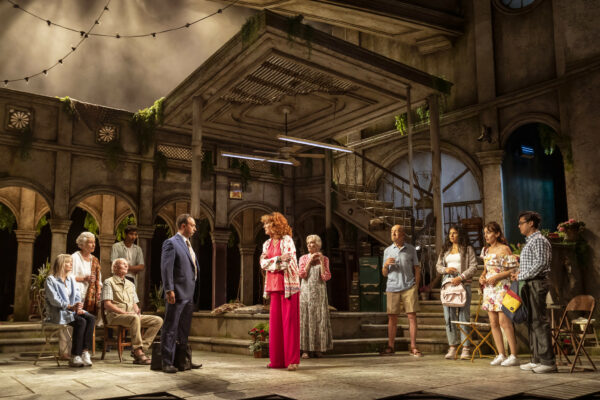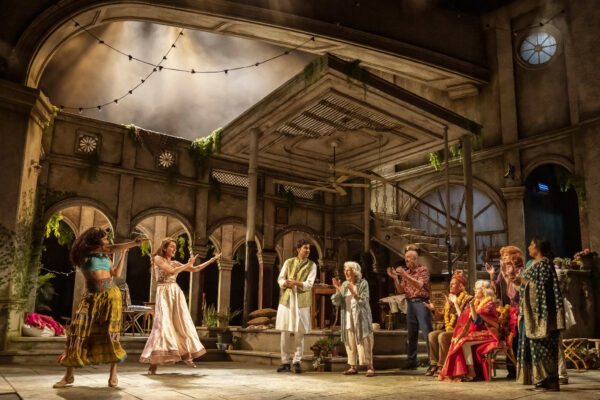
The Best Exotic Marigold Hotel is a brand-new play, based on the best-selling novel These Foolish Things by Deborah Moggach OBE FRSL, taking its name from the novel’s (better-known) film adaptation.
The story centres on a group of retirees who, for various reasons, locate to Jaipur, India – though the Marigold Hotel is not as advertised. The hotel is ran by a middle-aged widow, Mrs Kapoor, and her thirty-something son (fittingly called Sonny), who, still reeling from the death of their patriarch, struggle to run the business like he did. A subplot involves a local call centre, which both the main British and Indian characters (Evelyn and Sonny, respectively) have links to.
The set design is exceptional. The spectacular static set is the inside of the Marigold Hotel. The detail in the design is dazzling. It looks very realistic, right down to the textures of the materials, some of which appears worn and in need of a clean. You could spend ages looking at the set. Towards the end of the second act, I noticed an electronic insect killer. I love that somebody though so hard about the set design that they thought to include a fly zapper!
The music is, unsurprisingly, gorgeous. It’s very ‘White people in India’ vibes, but this is a play about White people in India, so it works! It is used especially effectively in scene changes, and the final scene, which sees the entire cast doing a traditional Indian dance, is a sensuous delight.

The all-star cast is exceptional. It is lead by the aforementioned Hayley Mills, an Oscar, BAFTA, and Golden Globe winner (and three-time BAFTA and three-time Golden Globe nominee). Mills is best-remembered for playing the lead roles in the original edition of The Parent Trap; she starred in the first four films, the latter three as an adult.
Whilst the entire cast is likeable, Mills’ character, Evelyn, warms the theatre every time she is onstage. Anyone who has worked in retail and/or hospitality knows that there are two types of elderly customers: adorable OAPs and joyless geriatrics, with absolutely no in between. Evelyn is, indisputably, the former.
BAFTA nominee Paul Nicholas shines as Douglas, a man who questions his love for the woman he has been married to for decades. It was especially exciting seeing Nicholas onstage, given his legendary theatre career: he was part of the original casts of Cats and Blondel, the original West End cast of Jesus Christ Superstar, and the first UK tour of Doctor Doolittle.
His wife, Jean, is played by Eileen Battye. Whilst she is zealous and determined, the writers never vilify her as an attempt to garner audience sympathy for Douglas, who wants to leave her for another woman. Rather, the play presents them as two good people who have just outgrown each other. It is nobody’s fault; it’s just life.
Jean has been to India before; she’s your typical ‘White girl in India’, but she does truly care about the country and its people. She even makes a brief mention to the horror of colonialism, criticising Madge and Norman for continuing the colonial legacy, what with their determination to find Indian lovers.
Madge is played by the most marvellous Rula Lenska (Coronation Street), a scene-stealer who oozes sex appeal and sass whenever she is onstage. Madge is like a much nicer, much, much more sober version of Patsy (Dame Joanna Lumley DBE FRGS) from Absolutely Fabulous.
Andy de la Tour (Notting Hill, Oliver Twist, The Brief) is hilarious as the insufferable Norman. He plays the archetypal narrow-minded, racist, sexist, old man, what some might term ‘Kevin’, ‘Gavin’, or even the controversial ‘gammon’ – but he never steps into caricature. At one point, Norman uses the word “woke”, the latest right-wing buzzword to describe anything or anyone who dares to care about others (especially marginalised peoples). The writers are aware of current topics and trends, and they weave them into the script seamlessly. It is never preachy; it just is.
Marlene Sidaway (Coronation Street) is hilarious as the well-meaning but occasionally offensive Muriel. A hilarious moment comes when she is talking to the owner of the hotel, Mrs Kapoor, about her hometown of Tooting. She reminisces about the past before complaining, “You wouldn’t recognise Tooting; it’s full of” – but she stops herself just in time.
Richenda Carey (Dorothy) can be considered the soul of the show – especially in that beautifully devastating scene towards the end of the play. Dorothy, aka Dot or Dottie, is a bit of a background character at first, with even the other characters commenting on her elusiveness. But a touching twist adds depth to her character; it’s a genius way to shine a light on a supporting character in an ensemble piece; delving into all of the characters’ backgrounds early on would have been too confusing for the audience.

The piece also stars several spectacular South Asian actors. Rekha John-Cheriyan plays Mrs Kapoor, a stereotypical South Asian mother: loving, supportive, critical, and overbearing. Early on in the play, her perpetually stressed son, Sonny (played by the exceptionally talented Nishad More) jokes, “Behind every Indian man there is his mother,” to laughter from the majority White audience. South Asian mothers are so notoriously overbearing that even White people know it!
John-Chriyan ticks every box of the archetype that she is playing. I was humoured when she kept bursting into tears, manipulating Sonny into supporting her, then suddenly lifting her head to reveal she is perfectly fine.
Tiran Aakel plays Mr Gupta, a semi-antagonist who gradually softens, testament to the play’s insistence on blurring the black and white (people are not two-dimensional archetypes).
Harmage Singh Kalirai is fantastic as the warm, caring, fatherly Jimmy, especially once he is reintroduced to his old friend.
Shila Iqbal (Emmerdale) and Kerena Jagpul play Sahani and Kamila, respectively. Both call centre workers, the former is a romantic love interest for Sonny. Iqbal and Jagpul are wonderful as the passionate youngsters.
The inclusion of a call centre is funny, for we have all received calls from Indian call centres, many of the workers going by Western names (something which the play touches upon). The play must be commended for its humanisation of call centre workers, ordinary people who are just trying to get by – and often receive abuse by entitled, impatient Western customers.
The cast is rounded off with the amazing Anant Morhan, who plays both Mohan and Tikal. The former, a member of India’s lowest caste (Dalit) who works as a cleaner in the hotel; the latter, a fellow worker at the call centre.
Mrs Kapoor tells Muriel that the lowest caste used to be known as the “Untouchables,” to the horror of Muriel (who, herself, has some problematic views). Muriel and Mohan develop a beautiful friendship, each learning from the other. Two extremely different people from very different parts of the world who just want to be happy.
I was glad to see the play address serious issues, such as colonialism and the Caste system, though it might have made the connection that colonialism made the Caste system (and so many other problems in India) so much worse. In fairness, though, the writers probably did not want to stray into activism.
One might criticise the play for turning the White characters into White saviours, with Muriel, clearly a bit of a racist, representing the civilised West and calling Indians out for the barbarity of the Caste system (even though Muriel’s ancestors are largely responsible for it).
Evelyn, meanwhile, makes it her mission to “save” the call centre staff from their tyrannical boss and the awful working conditions.
That said, the workers also help the guests at the hotel. The play never renders its Indian characters victims. On the contrary, they are active heroes trying to better their lives – but also there to help their British visitors. The play shines a light on two very different groups of people (and the members of those groups are, themselves, very different) coming together, supporting each other, and forming lifelong friendships (well, at best a decade for the older lot).
The Best Exotic Marigold Hotel runs at The Lowry (Lyric Theatre) from November 8 to 12 and tours the UK until early June 2023 – including a stint on Queen Mary 2, a transatlantic crossing from Southampton to New York!
Please note: Mills, Nicholas, Lenska, De La Tour, Sidaway, and Carey depart the hotel after Theatre Royal Nottingham (February 7-11), whilst Harmage Singh Kalirai checks out after Theatre Royal Bath (November 28 – December 3) – ahead of the stint on the voyage.







